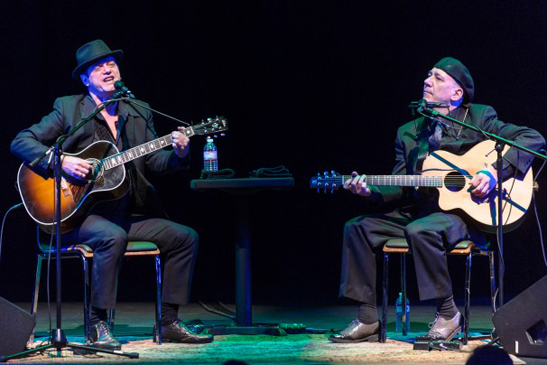
11 de marzo de 2014

Auseron and Perro are the same person, which could have confused the uninitiated listener. But there didn’t seem to be many of those in the small yet fervent audience, which cheered every aspect of the set. This was a show for fans familiar with both the musician’s repertoire and his native language. The singer-guitarist spoke in English as well as Spanish, but favored the latter.
Perro opened with “Rio Negro,” the title song of his latest album and a fine example of his eclectic approach. It’s a gentle ballad, but with sauntering guitars that draw on both blues and American country music. Perro and his accompanist, guitarist and occasional vocalist Joan Vinyals, both played plugged-in acoustic instruments. But Vinyals occasionally stepped on a pedal that gave his guitar a more electrified tone, whether he was playing “Rio Negro’s” bluesy bent notes or the “La Bamba”-style rock-and-roll of the show’s final encore, the exuberant “Fonda de Dolores.”
That closing tune was the only one that pulled Perro and Vinyals out of their chairs. For the rest of the evening, the pair sat and played relaxed material with an easygoing demeanor. Perro is a musicologist and philosophy student — he relates his stage name, which he translates as “John Dog,” to the doglike Greek Cynic philosophers — who sometimes seemed as much raconteur as musician. He also occasionally employed a canine growl, although that was a small part of his versatile vocalese, which ranged from his usual tenor to falsetto, scat singing and a bit of near-operatic baritone. For “Flamingo,” a 1940s standard that was the only tune sung in English, the vocalist did a credible impression of a mid-20th-century New Jerseyite.
Perro performed just 15 numbers in 75 minutes, but that wasn’t because they were lengthy. In fact, the one that ran the longest, “Reina Zulu,” did so because it featured not only a chatty introduction but also an extended spoken aside midway through. Perro explained that the lyric was inspired by a New Orleans waitress whose regal manner couldn’t prevent him from singing about her in D.C. and elsewhere. Even in the lively version performed on Sunday, however, “Reina Zulu” was too genial to qualify as an act of vengeance.
By Mark Jenkins The Washington Post